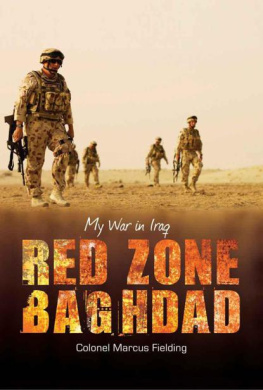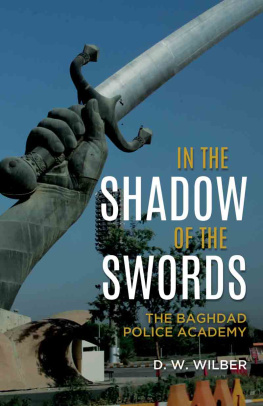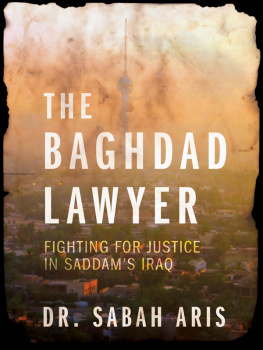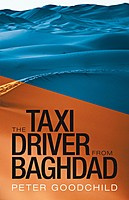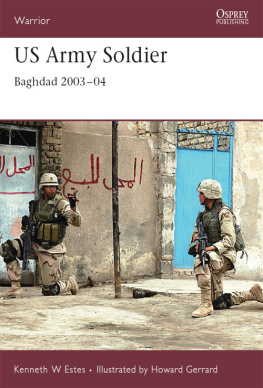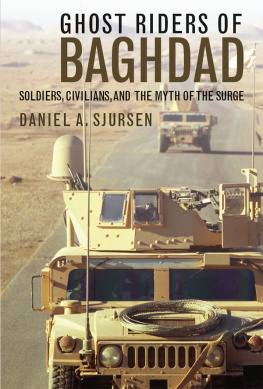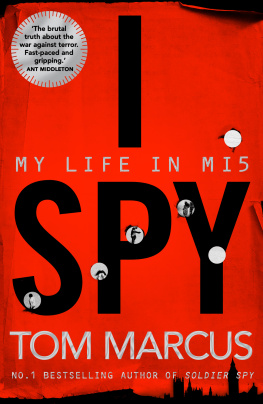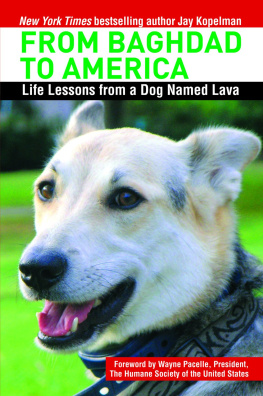


www.bigskypublishing.com.au
Copyright Colonel Marcus Fielding 2011
First published 2011
Copyright remains the property of the author and apart from any fair dealing for the purposes of private study, research, criticism or review, as permitted under the Copyright Act, no part may be reproduced by any process without written permission.
All inquiries should be made to the publishers.
Big Sky Publishing Pty Ltd
PO Box 303, Newport, NSW 2106, Australia
Phone: | (61 2) 9918 2168 |
Fax: | (61 2) 9918 2396 |
Email: | info@bigskypublishing.com.au |
Web: | www.bigskypublishing.com.au |
Cover design and typesetting: Think Productions
CIP entry is available from the National Library of Australiay
Author: Fielding, Marcus.
Title: Red Zone Baghdad: My war in Iraq/Marcus Fielding.
ISBN: 978-1-921941-17-7
This book is dedicated to all those men and women in the arena.
It is not the critic who counts; not the man who points out how the strong man stumbles, or where the doer of deeds could have done them better. The credit belongs to the man who is actually in the arena, whose face is marred by dust and sweat and blood; who strives valiantly; who errs, who comes short again and again, because there is no effort without error and shortcoming; but who does actually strive to do the deeds; who knows great enthusiasms, the great devotions; who spends himself in a worthy cause; who at the best knows in the end the triumph of high achievement, and who at the worst, if he fails, at least fails while daring greatly, so that his place shall never be with those cold and timid souls who neither know victory nor defeat.
Theodore Roosevelt,
The Citizenship in a Republic
address to the Sorbonne, Paris,
23 April 1910


(Retired)
There are few books about Australias involvement in the war in Iraq.
The invasion predominantly involved Special Forces, and their history has yet to been written.
Our first training team in northern Iraq, assisting the newly-created Iraqi Army, did very good work but to the disgust of its members was not permitted by Government to accompany the Iraqis into battle.
Our logistic trainers passed their skills on most impressively and to the praise of their US hosts, but this subject has not attracted an author yet.
The Australian Battle Group deployed in southern Iraq was a fine combat unit that, again, was not permitted by Government to join the fight except in highly restricted situations, which rarely eventuated.
The one group that existed almost from the time that the Coalition was formed in Iraq was that group of Australian soldiers that were embedded in various coalition headquarters.
This group were collectively known as embeds.
Marcus Fielding, a colonel in the highest Coalition headquarters in Iraq, tells his story in this book as one embed over nine months. It is a story set at the conclusion of the Australian involvement in Iraq.
Each war produces its own language and sayings, and the war in Iraq was no exception. Among a plethora of terms specific to that war, embed must be one of the most common. I like to think of it as deriving from the act of embedding foreign bodies in a host.
Most Australians would have first heard the term applied to the media being embedded in a combat unit. But, as many people did not realise, soldiers too were embedded. In the military environment, members of the Coalition found themselves attached as individuals to what were called Coalition headquarters, but were in fact US headquarters with small numbers of foreign soldiers performing various roles. The most common foreign soldiers in these headquarters were Australians.
We look at the US and see the mightiest military power that has ever existed on this earth. But with combat operations in Iraq and Afghanistan running concurrently, the US was short of soldiers, especially soldiers with specialist skills. At the risk of generalisation, the US tended to put its best and brightest in the tactical headquarters and units doing the fighting that is, from the Corps level down while scrambling to fill the positions in the higher-level headquarters from any available source, including its allies.
Most headquarters are big. Only those who have never had to run a war think you can economise on manpower by stripping it out of headquarters. The highest Coalition headquarters in Iraq, Headquarters Multi-National ForceIraq, or MNF-I, demanded large numbers of trained and skilled personnel. On many occasions the US did not have that manpower, so they were very happy to have Australians among them.
Had we been as stretched for manpower as the US during the war in Iraq, we may have been forced to send officers with less experience and skills than we did. But we were not stretched, and the officers we sent to Coalition headquarters officers like Colonel Marcus Fielding were fresh, experienced, skilled and trained to a standard that meant that, with few exceptions, they were at least as good as, if not a good deal better than, their US counterparts. For these reasons, our embeds in US headquarters, as a rule, stood out and were noticed.
I am honoured to be asked to write the Foreword to this book, because I too was an embed in the same headquarters as the author, but at an earlier time. I was there in the second year of the stabilisation phase following the invasion.
In the first year of the war, the satisfied feeling resulting from the successful invasion was soon replaced by a deep unease as the looting occurred, the insurgency appeared, and the sectarian lines were drawn. In the second year of the war, my year, violence had only just begun to peak, but peak it did.
So I saw the war at its incipient stage. Here, by contrast, Marcus gives us a description of life in a large Coalition headquarters at the end stage of the conflict for Australians.
The war in Iraq was contentious even before it began, remained contentious during its execution, and will be contentious whenever it finishes.
Most people I spoke to who were strongly against the Iraq war felt that way because of the invasion of the country and the issue of weapons of mass destruction. This seemed to mean that they had no emotional or intellectual energy left to address the question of how well the counter-insurgency that followed the invasion was run, or even the nature of that conflict.
Colonel Fieldings book serves to show the complexity of running a modern counter-insurgency, even at a time when we were in the process of getting on top of our enemy.
It also brings into focus one aspect of the nature of a military alliance. The aim of many members of the alliance in Iraq was to get the US to do most of the heavy lifting, and to limit what they, as junior partners, did themselves. This is very common in an alliance. Australia was in Iraq to show solidarity with our great and powerful ally, and had no real intention of getting heavily involved in the fighting. The morality of this approach to alliance warfare, in my view, is highly questionable, but that is an issue for another day.
Next page
